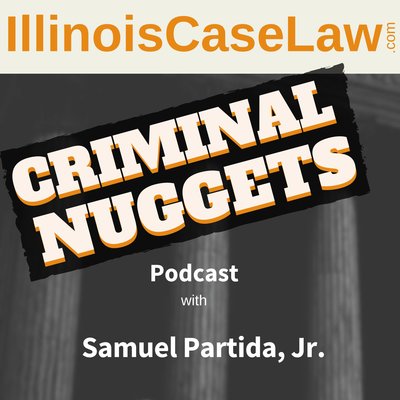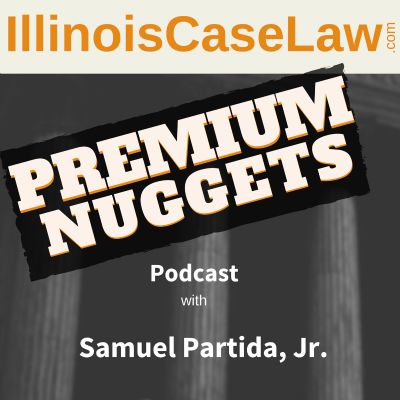Apr 22, 2019
People v. Corral, 2019 IL App (1st) 171501 (March). Episode 618 (Duration 11:38)
Kid got his eyewitness expert witness on the stand, but the witness was not allowed to get into what she thought about the reliability of the witness.
Gist
Buyers in a deal to purchase some cannabis instead shot the dealers in an attempt to take the weed. The shooter was a 16 year old. One man was hit 8 times and died.
The dealer identified defendant then picked his photo out of a live line-up.
Kid got 31 year sentence.
No Other Physical Evidence
There was no fingerprints, blood, or DNA belonging to defendant discovered at the crime scene. Police could not establish any direct phone contact between the shooter and other codefendant.
However, defendant’s cell phone was missing the “SIM card” and therefore he did not submit the cell phone to the Regional Forensics Computer Laboratory for analysis.
The Eyewitness Expert
Dr. Kimberly McClure testified as an expert in the field of eyewitness identification without objection.
She testified that even under optimal circumstances, i.e., where “a person has all the time in the world to view, the person is not under any duress or stress, and the person has an immediate opportunity to identify the person that they saw,”
there is only “67 to 70 percent” accuracy in those identifications.
Dr. McClure opined that the factors that tend to reduce the reliability of an eyewitness identification were present in the case.
Regarding Vargas’s degree of attention during his encounter with defendant, Dr. McClure testified that,
- the encounter commenced as something routine and not very memorable
- attention seemed to be on the older adult male that was involved not defendant
- the victim was focused on the weapon
- memory decay is an issue the longer a witness goes without making an ID
- on inattentive blindess
Inattentive Blindness
“Inattentive blindness” is where “we can interact with someone and we can see that person clearly, and it seems as if we are processing information about them but in fact we are not really processing information that’s related to the person’s face or how she or he might look and how we might subsequently be able to recognize them.”
Intervening Variables
Dr. McClure also discussed the “intervening variables” between the event and the actual identification that can impact memory.
Intervening variables “impact and change memory because we don’t just witness the event and never talk about it again. We might tell our friends, we might tell our family members. Each time we are retrieving that information it has the potential to change how we remember that experience and how we remember the individual involved.
It is common for these intervening events to actually get incorporated into memories. We call that the misinformation effect.
48 Delay Here
Specifically addressing the 48-day delay between the shooting and the witness ID being presented with the photo array, Dr. McClure testified that it is a “very long time” in terms of memory.
She noted that after 72 hours there is a detrimental effect on memory and it “drops off quickly, very fast. After 72 hours, 40 to 50 percent is a ballpark figure that I am pulling from my recollection.”
The Photo Array & Lineup
In this case, the lead detective and therefore not an independent administrator, conducted the photo array and lineup. Dr. McClure further testified that it was problematic that defendant was the only individual who appeared in both the photo array and the lineup.
According to Dr. McClure, one cannot be sure that the victim’s identification of defendant was because “he was actually there during the event or was it because he was the only person that was also in the photographic lineup.”
On cross-examination, Dr. McClure testified she was not compensated for her testimony apart from her travel and accommodation expenses and that this was the first time she had testified as an expert in eyewitness identification.
Helpful To The State
Dr. McClure testified that “most of the time people are pretty accurate” when describing basic features such as gender, ethnicity, and general physicality.
Dr. McClure further testified that memories related to traumatic experiences can be retained over time and that an individual’s memory can increase during a traumatic event. According to Dr. McClure, however, there is an upper limit to an individual’s ability to retain memories when under duress. Once an individual’s ability to cope with the stress is exceeded then his memory deteriorates.
Confidence & Retrieval Fluency
Dr. McClure also testified that when one is questioned over a period of time there is not an increase in accuracy in memory, but an increase in confidence. This means that someone can be confident in his memory because he has had “retrieval fluency,” i.e., he has practiced retrieving it and told a story to himself and others for so long that he is confident he is correct when in fact nothing has happened to affect the individual’s accuracy.
To this end, Dr. McClure further testified that while repeating a memory during an interview can “lock in an accurate memory” that only occurs where there is no misleading information or misinformation provided during the interview, because that misinformation can also be incorporated into the memory leading to “irretrievable effects.”
Dr. McClure also testified that the victim had the opportunity to go over the details of the event with detectives and the state’s attorneys several times. In that vein, Dr. McClure testified that eyewitness confidence or certainty is not a good indicator of accuracy and that the retrieval process can actually inflate confidence “so people appear as if they are more confident about what they saw but they are not any more accurate about what they experienced.”
Not Allowed
The only testimony Dr. McClure was excluded from presenting was her own opinion as to whether or not Vargas’s identification of defendant as the shooter was reliable.
Issue
Defendant maintains the trial court abused its discretion when it did not allow Dr. McClure to testify regarding her ultimate opinion of whether or not the victim's testimony was reliable.
Opinion On Credibility Testimony
Notably, in Lerma, Dr. Loftus also indicated he would not “issue judgments” about whether the witnesses’ memories or assertions were correct and that any part that implied the unreliability of the eyewitness should not be construed as meaning that the defendant was innocent.
Under Illinois law, it is generally improper to ask one witness to comment directly on the credibility of another witness. People v. Kokoraleis, 132 Ill. 2d 235, 264 (1989); People v. Henderson, 394 Ill. App. 3d 747, 753-54 (2009). This is because “[q]uestions of credibility are to be resolved by the trier of fact.” Kokoraleis, 132 Ill. 2d at 264.
Thus, in this case the trial court did not abuse its discretion when it prohibited the defense from presenting Dr. McClure’s opinion regarding the reliability of Vargas’s identification.
Holding
We observe that “[a] trial court is not required to allow an expert to render an opinion on every conceivable question simply because such expert is qualified to do so.” People v. Cloutier, 156 Ill. 2d 483, 502 (1993). Given the facts of this case, the trial court properly limited Dr. McClure’s testimony, as such testimony could constitute direct, adverse comment on Vargas’s credibility.
In doing so, the trial court correctly left the issue of whether the State established the identification of the shooter to the jury. Therefore, based on the record before us, we find that the trial court’s decision was not arbitrary or unreasonable and does not amount to an abuse of discretion.
We therefore conclude that the trial court did not err in prohibiting Dr. McClure from testifying and rendering her opinion as to the reliability of Vargas’s identification, especially where such testimony “is clearly a function of the jury, not a purported expert.”
See Also
- Episode 293 - People v. Anderson, 2017 IL App (1st) 122640 (January) (Trial court distinguishes Lerma to deny the use of an eyewitness expert in this case where the facts were stronger against defendant.)
- Episode 604 - People v. Macklin, IL App (1st) 161165 (March) (defense counsel no ineffective for not calling an eyewitness expert witness)
- Episode 132 – People v. Lerma, 2016 IL 118496 (January)(Eyewitness Expert Testimony Validated by Illinois Supreme Court)
- See also Podcast 027 summarizing the lower court on this eyewitness expert testimony issue
- Episode 247 - Interview With Karen Daniel on Eyewitness Expert Litigation
- Episode 246 - Interview With Shari Berkowitz Expert on Eyewitness Identification
- Episode 578 -In re N.A., 2018 IL App (1st) 181332 (December) (No expert called in this single finger eyewitness identification case)
- Episode 392 - In re Christian W., 2017 IL App (1st) 162897 (August) (clear case where police fed the witness information)



